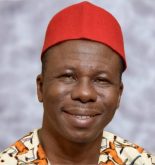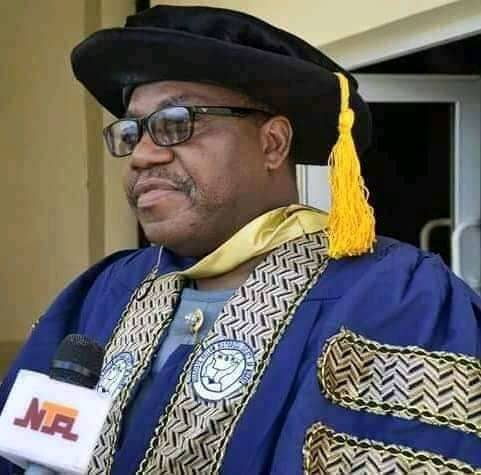BY PROF. MIKE A. A. OZEKHOME, SAN
INTRODUCTION
A HARVEST OF DEATHS
It has been a harvest of deaths in the judiciary. Justice Raphael Chikwe Agbo, a ranking Justice of the Court of Appeal, died on July 3, 2023. Then Justice Chima Centus Nweze died on Sunday, July 30 2023. The Hon. Justice Kate Abiri, erstwhile Chief Judge of Bayelsa State, who retired only on 13th January 2023, died on 3rd August, 2023. To say I am heart-broken by this harvest of premature deaths is an understatement. More so for Justice Abiri, who only at 6. 51am on the 3rd, August, 2023, had sent whatsapp messages to me, which was her usual daily morning devotional prayers. She had done this for years. The title of this particular prayer that she posted obviously few hours before the Lord’s call was, “How lovely is your Dwelling place, Lord”. (Thursday, 3rd August, 2023). Did the beautiful and ageless late Justice Abiri foresee her death coming and yearned for my “Lord’s lovely Dwelling place”? I do not know. Or, do you?
DEATH, THE ULTIMATE END OF MORTALS
Given the human nature of our frail bodies, everyone must experience death. God almighty, from whom every living being and thing springs forth, determines when we must experience death. Death is therefore like the second skin we wear. It follows us everywhere like a shadow in the morning, afternoon and night. Yes, at home, in the market, farm, work place, school, road, river, air- just any and everywhere. It is the surest thing about a man’s sojourn on earth: we must all die. What we do not know is when, where, why and how. And what happens thereafter still lies with God only. This is one of the reasons I do not discredit the dead no matter the occasion. They should be honoured, with their sins forgiven; rendered clean like a tabula rasa; as white as snow.
WHO WAS JUSTICE CHIMA CENTUS NWEZE?
Late Justice Centus Nweze was a prominent figure in the Nigerian legal system, better known for his deep commitment to justice, impeccable integrity and a brilliant legal mind. Throughout his illustrious career as a Justice of the Supreme Court of Nigeria, he left an indelible mark on the country’s jurisprudence and stood tall as a beacon of hope for the rule of law. His demise, though a very painful one, is something we have to accept as one of the vicissitudes of life. This piece seeks to extol the virtues of this remarkable Jurist, while also shedding light on the challenges he faced in his pursuit of justice, like his peers.
FROM TENDER FEET TO ADULTHOOD
Born on the 25th of September, 1958, in Obollo, Udenu Local Government Area of Enugu State, Nigeria, Hon. Justice Chima Centus Nweze’s early life was driven by a passion for knowledge and justice. He was very determined in his pursuit of excellence. He bagged all his degrees – from Bachelors and Masters, to Ph.D – from the same University of Nigeria, Nsukka. He was called to the Bar in 1984 (39 years ago).
Justice Nweze engaged in private legal practice for ten solid years (1985 – 1995), where he quickly gained reputation for his brilliance, erudition and integrity.
HERE COMES THE CEREBRAL JUDEX
Justice Nweze’s dedication to the legal profession earned him recognition and respect, leading to his appointment as a Judge in the Enugu State Judiciary in 1995. He served variously as Chairman, Robbery and Firearms Tribunal, Nsukka (1998 and 1999); Member, Ondo State Local Government Election Petition Tribunal (1999); Chairman, Ogun State Governorship and Legislative Houses Election Petition Tribunal (1999); and Administrative Judge, Nsukka Judicial Division, Enugu State, 2001. His Lordship also served in various other capacities in extra-judicial vocational activities. A cerebral Author, Nweze wrote many books on advocacy, human rights, Sociology of Law, Judicial Sustainability of Constitutional Democracy in Nigeria, etc. He was very well-read. A deep researcher, Nweze had authorities to support all his verdicts. His scholarly depth and breadth in legal matters were simply ineffable.
CLIMBING THE JUDICIAL LADDER
On the 15th of February, 2008, His Lordship was elevated to the Court of Appeal, where he continued to distinguish himself as a conscientious Jurist. Nweze reached the pinnacle of his legal and judicial career when he was appointed a Justice of the Supreme Court of Nigeria on the 29th day of October, 2014. From this esteemed position, he contributed significantly to the development and interpretation of Nigerian laws, ensuring justice for all and upholding the principles of the Constitution and constitutional democracy. Nweze broadened the scope, plenitude, amplitude and landscape of Nigerian legal jurisprudence.
NWEZE’S UNWAVERING COMMITMENT TO JUSTICE
Late Justice Nweze was widely admired for his boldness and unwavering commitment to justice and the rule of law. He firmly believed that justice should be blind and applied equally to all, regardless of their station in life, background, wealth, or influence. Throughout his career, he consistently demonstrated fairness and impartiality in his judgments, earning him the respect of both legal minds and the general public. He is popularly known as the “dissenter” in the Supreme Court, for his many telling dissenting judgements that open up new vistas of law.
ONE CASE THAT EXEMPLIFIED HIS STRENGTH
In his dissenting judgment in the application for review filed by Emeka Ihedioha and the Peoples Democratic Party (PDP) (Uzodima & Anor v. Ihedioha & Ors (2020) LPELR-50260(SC)), one of the most popular of them all, Nweze held that the apex court had the power to revisit or review its decisions. He noted that the bad decision of the Supreme Court in the matter which made a number four candidate to become number one and Governor, will “sooner or later, hunt our electoral jurisprudence”. Though this resonating verdict could not overturn the majority decision of his learned brothers who insisted on the finality of their decisions, history and posterity will continue to remember and judge him fairly for his boldness, passion and courage in taking on all his colleagues, notwithstanding that he was in the minority.
Nweze did not believe that the finality of the Supreme Court should necessarily amount to its infallibility; contrary to the earlier opinion expressed by the apex court in the celebrated case of Adegoke Motors Nig Ltd v. Adesanya (1989) LPELR-94(SC).
NOT ROSY ALL THE TIME
It was not all the decisions in every case in which he participated that however went down well with the Nigerian people. In the Ahmad Lawan v. Bashir Machina case (the decision of which I have sine approached the apex court for a kind calm review), some people felt that the learned Justice sacrificed justice on the altar of mere form and technicality. His lead judgment in that 3-2 split decision case, has been widely criticized as a very unfortunate one.
Many Nigerians believe that the then Senate President, Lawan, never participated in the APC Senatorial primary for the Yobe North Senatorial District, held on 28th May, 2022, as he had voluntarily withdrawn to participate in the Presidential Primary held on 8th June, 2022, in clear breach of section 82(5) of the Electoral Act, 2022. It is widely believed that Machina had duly and lawfully emerged as the unopposed winner of the primary; while Lawan contested and lost the presidential ticket to Asiwaju Bola Ahmed Tinubu. Indeed, INEC had never supported Lawan on this. Both the Federal High Court and the Court of Appeal affirmed Machina’s victory.
The apex court in a verdict led by Nweze upturned the two lower courts’ decisions on the ground that Machina ought not to have commenced the suit by Originating Summons without leading oral evidence to prove allegations of fraud. Yet, there were no averments bordering on allegations of fraud in the entire affidavit deposed to by Machina. More significantly, the very Pre-Election Practice Direction had prescribed Originating Summons as the only mode to approach the court on matter concerning party primaries. Many could not understand (I am one of them), why a party should be penalized for obeying the law. Many felt the decision was too technical as it dwelt more on form, rather than on substance and justice. See the case of Bello v. Attorney-General of Oyo State 1986) LPELR-SC.104/1985; (1986) 5 NWLR 820.
DEALING WITH COMPLEX LEGAL ISSUES
Justice Nweze left his huge indelible imprints in many other cases.
In the case of Bio v The State (2020) 7 NWLR (Pt. 1723) 218, an appeal that the Supreme Court unanimously dismissed, Justice Nweze elucidated:
‘“Fair hearing”’, in essence, means giving equal opportunity to the parties to be heard in the litigation before the court. Where parties are given opportunity to be heard, any of them that abuse such opportunity, for example, by not presenting his case or by absenting himself, cannot complain of denial of fair hearing.”
On probative value of an unsigned document, Nweze waxed lyrical thus:
“Documents which do not bear the signatures of their makers should attract little or no weight. An unsigned document is lacking in value and is worthless. An instrument that is unsigned is inadmissible”. Per Nweze, JSC, in the case of APGA v Al- Makura [2016] 5 NWLR (pt 1505).
On the legal effect of not complying with statutory procedure for the commencement of an action, Nweze enlightened and dissented in the recent case of Riok Nig. Ltd v. Incorporated Trustees NGE (2022) 16 NWLR (Pt 1857) 725, as follows:
“Where a procedure for carrying out a matter is clearly spelt out in a law, a party has no choice but to comply fully with the procedure. Failure on the part of a plaintiff shows that he has not fulfilled the condition precedents for commencement of such action”.
As a ranking member of the Supreme Court, Justice Nweze often faced many complex legal issues that required careful analysis and interpretation. Some cases involved intricate constitutional matters. Striking a balance between different legal principles and competing interests which demanded exceptional legal acumen and judgment, always reared their heads.
One of such was the Machina case. The negative reactions generated from this case, appeared to have elicited some coldness towards Justice Nweze, given that Ahmad Lawan never participated in the primary election organized by his party and duly supervised by INEC in that appeal.
Even then, notwithstanding the negative reactions that greeted the judgment in Machina’s case, Justice Nweze’s integrity, brilliance and legal acumen were palpably evident in the eloquence and depth of his judgment. That was how he saw the issues. Nweze simply possessed a keen understanding of the law, which he artfully applied to unravel many complex legal issues. His judgments were often characterized by well-reasoned arguments, meticulous research and a profound knowledge of legal precedents, making them valuable guides for future cases. Nweze’s oratorial prowess and the admissible way and manner with which he simplified complicated legal concepts will be missed by all, especially the legal profession.
That Justice Nweze committed human errors like all of us mortals is to be expected. Afterall, can a man ever attain infallibility? Are we God? No. His lead judgement in the Machina case, I humbly submit therefore, should be seen as one of such mere human mistakes of the head, and not of the heart. May God, forgive him for this only one misstep. Amen.
NWEZE’S INTEGRITY AND MORAL COMPASS.
Thus, integrity remained the cornerstone of Justice Nweze’s entire being. His personal and professional conduct was guided by a strong high moral compass, earning him the trust and admiration of his peers and members of the public alike. His numerous writings and judgements are clear attestation of this inclination. Nweze had a high reputation for honesty and incorruptibility; and served as examples for others in the legal profession and beyond to follow.
CHALLENGES FACED BY JUSTICE CENTUS NWEZE AND OTHER JUDGES
CASE OVERLOAD AND JUDICIAL BACKLOG
One of the most significant challenges faced by Justice Nweze and his colleagues on the Supreme Court Bench is the overwhelming case backlog. Nigeria’s judicial system has long been plagued by inordinate delays, with a backlog of cases piling up over the years. This situation limited the Court’s ability to deliver timely justice. This has led to frustration for litigants seeking timeous resolution of their cases. The Nigerian Supreme Court is unarguably the busiest in the whole wide world, with inconsequential matters from villages meandering and snaking their labyrithine ways to a whole apex court, in Abuja. A decentralization of the court system as operates in America is what we desire. In the USA, each of the 50 states has its own court hierarchy from the lowest court up to the Supreme Court; with the Federal Supreme Court situate in Washington DC reserved for more important national and constitutional issues.
CORRUPTION AND INFLUENCE-PEDDLING.
The Nigerian judiciary has, at times, grappled with numerous allegations of corruption and influence-peddling. While Justice Nweze maintained an impeccable reputation for integrity, these issues within the broader legal spectrum pose a major threat to the administration of justice. The presence of corruption could undermine public perception and trust in the Judiciary; and ultimately erode confidence in the rule of law. Justice, says the Supreme Court, is rooted in confidence. See the case of Imam v. FRN (2019) LPELR-49468(SC). It is obvious that Justice Nweze was not corrupt. His Spartan-like life exemplified this. When I visited the bereaved larger family, including his very wife and children at his Maitama home, Abuja, after his demise, I beheld a surprisingly sparsely furnished nondescript duplex, bereft of any sign of opulence, luxury, gravitas or panache.
It is just like any other ordinary duplex built by some low income workers; or at best, middle level Civil Servants. Is this accommodation for a whole Justice of the Supreme Court (the highest court of the land)? Is that what other Justices of the apex court go through? I shuddered and wondered! Haba! I was and I am still dazed and pained as to why the Judiciary is so marginalized, neglected, ignored and despised. Yet, everyone runs there for succor.
Perhaps, Alexander Hamilton was right afterall in his Federalist paper No. 78 that the Judiciary is the weakest arm of government, for it has neither purse nor sword. Imagine a whole Chief Justice of Nigeria, being ranked number 5 in the official order of precedence, after the President, Vice President, Senate President and Speaker of the House of Representatives. Yet, he is the head of one of the three arms of government. This is absurd and shameful. The proper order should simply and commonsensically be President, (Executive, section 5); Senate President (Legislature, section 4); and Chief Justice of Nigeria (Judiciary, section 6), all of the 1999 Constitution, as altered.
That was the tripartite division of government functions that Baron de Montesquieu taught us as far back as 1748, in his doctrine of the separation of powers. Imagine the news that Justice Nweze was said to have died after a brief illness occasioned by a surgery in a Nigerian hospital. Such a surgery is usually taken for granted in more advanced countries of the world. Was it due to paucity of funds and impercuniosity that prevented him from seeking better medical attention abroad? I do not know. Or, do you? Justice Nweze’s sad case shows how the Nigerian society kills its best. A great pity indeed.
CONCLUSION
Late Justice Chima Centus Nweze was an exceptionally outstanding Jurist of impeccable credentials. His legacy continues to inspire the Nigerian legal and non-legal community. His resolute, unflunctuating and untrammeled erudition, deep commitment to justice, exceptional legal acumen, penetrating lucidity and fecundity of mind and thought, and his unwavering integrity and character, have all combined to set a very high standard and benchmark for his peers and future generations yet unborn.
Despite the challenges he faced, Justice Nweze remained steadfast in his pursuit of justice, equity, egalitarianism, rule of law, respect for human rights and nation-building. He dutifully upheld the values, virtues and ethos that form the very foundation of a just society. As Nigeria’s legal system continues to evolve, the probity and uprightness exemplified by Justice Nweze will serve as a guiding light for the Judiciary and those who strive for justice in the nation. This is why he will never be forgotten. His noble deeds and pro-masses judgements, driven by his perception of issues from justice to law, rather than from law to justice, has inducted the Honourable Justice Chima Centus Nwezw into the pantheon of Nigerian juristic icons and heroes.
Adieu, milord. Good bye sir. Farewell, cerebral mind who never called me by my name, but by my popular traditional title of “Akpakpa Vighi vighi Edoland) (Generalissimo). May God Almighty forgive you your earthly sins and eternally rest your kind soul in His warm bosom. Amen, amen and amen.




